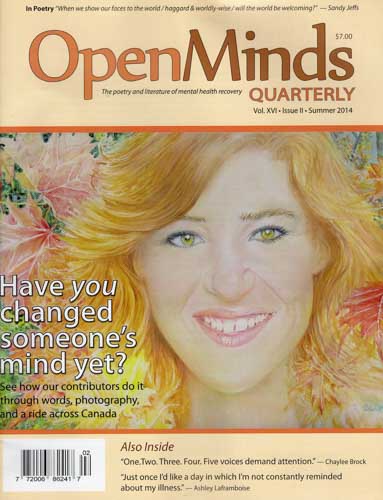Open Minds Quarterly – Summer 2014
One of the older philosophies of critical theory maintains that good art should reflect reality or enlighten us about the real world. The variety of approaches and perspectives that are available promise us that we can always be surprised by the next work of the next author. Such surprises come quickly in this issue of the Open Minds Quarterly. A ‘new’ reality comes to us through the works of artists who have to deal with a world that we may not have experienced. All of the contributions to the quarterly are meant to create an awareness of mental health issues, and they all do it very successfully, whether the piece is poetry, photography, an interview, or an essay. One of the older philosophies of critical theory maintains that good art should reflect reality or enlighten us about the real world. The variety of approaches and perspectives that are available promise us that we can always be surprised by the next work of the next author.
Such surprises come quickly in this issue of the Open Minds Quarterly. A ‘new’ reality comes to us through the works of artists who have to deal with a world that we may not have experienced. All of the contributions to the quarterly are meant to create an awareness of mental health issues, and they all do it very successfully, whether the piece is poetry, photography, an interview, or an essay.
From Chaylee Brock we gain an insight into the difficulties of dealing with multiple personalities:
One. Two. Three. Four. Five voices demand attention. Five sets of hands search for an exit.
My neck muscles twitch, my head tilts, and I’m falling backwards. The captain’s chair must be occupied at all time. Fights ensue among those waiting in the shadows, each desperate for control, desperate for their own share of time.
The photography of Amanda Tetrault is featured in combination with an interview of her experiences growing up with a schizophrenic father. Her frank responses and comments encourage the reader to find a copy of “Phil and Me” in order to appreciate both her photography and her experiences. Both the interview and photos help us “understand the complexity of mental illness and the effects that it can have on a family.”
Living with mental illness of any type is clearly a struggle, but ‘just talking about it’ doesn’t necessarily help to make changes. John Laue’s “How Creative Maladjustment Helped Me Change America’s Health Education System” is a personal essay that reminds us how much time and effort has to be dedicated to making even an acceptable change, let alone all that one would like to see happen.
In fiction, we are given Ashley Laframboise’s “Puzzles: A Story about Madness,” another finely done personal insight into psychosis. What works better? The interviews, the personal creative pieces, the photojournal, the images of the Northeast Hospital Anti-Stigma project? All of them are insightful; all of them are a sharing that reflects the reality of struggle; all of them tell us what could be:
I am walking
on a planet
in space
I don’t really know
what to do with this thought
with this fact
except to just enjoy it
so that’s what I do
I revel in my capacity
to be awestruck
by the obvious
These lines from Greg Evan’s “Planet” may be the best summary of these personal expressions of struggle.
[www.openmindsquarterly.com]





